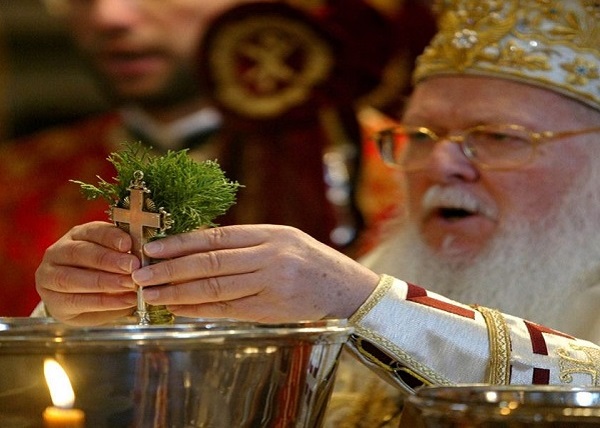How do we use Great Holy Water?
9 January 2017[Previous post: http://bit.ly/2iSI3lD]
Great Holy Water is recommended by spiritual guides in certain instances where the person confessing has fallen into a sin and doesn’t have a blessing to receive communion. In this case, his or her spiritual guide will suggest fasting and will offer Holly Water as a consolation. The Holy Water isn’t a substitute for Holy Communion, which is God’s greatest gift to us.
As regards the matter of Great Holy Water, the faithful have a number of questions. They ask: ‘Do we drink Great Holy Water on the eve of Theophany? Can we have Great Holy Water at home and use it?’ Often they get a rough and ready answer which simply confuses them.

Regarding the Great Holy Water and its preservation, Saint John Chrysostom says: ‘On this feast, everyone drinks some of it and then takes some home and keeps it for a whole year. And it remain crystal clear, though over time it should spoil. For a whole year, or often two or three, it remains unspoilt and as sweet as it was the day it was drawn from the spring’.
Blessing the waters on the day of Theophany is an ancient holy practice of the Church. We find prayers for blessing water in very old texts, such as the Apostolic Teachings, the Apostolic Tradition, the Prayer Book of Bishop Serapion of Thmuis and elsewhere.
It is conducted twice: on the eve of Theophany and on the day itself, after the Divine Liturgy. In both instances, the services is the same except that the prologue, the long sanctifying prayer, is read only on the day of Theophany. So on both days we have the Great Blessing of the Waters.
On the Holy Mountain, the monks drink the Great Holy Water not only on the day of Theophany. It’s their custom to drink holy water each day after the Divine Liturgy, and so they drink the Great Holy Water for eight days after Theophany, until the handing-back of the feast. So this Great Holy Water can be drunk. It’s drunk after communion and before we take antidoro, (or anything else). The text for Service of the Great Blessing of the Waters says: ‘… so that all who drink and receive it may have it for the purification of their souls and bodies, for the healing of sufferings, for the sanctification of homes and for all appropriate benefit’, and, especially, ‘, a ruination for demons, unapproachable to the adverse powers’.
Great Holy Water is a powerful means of healing – a medication given in exceptional circumstances. When it is sprinkled, evil spirits are expelled; everyday, venial sins are forgiven, that is demonic fantasies and obnoxious thoughts; maladies are cured and spiritual and bodily health is restored. In short, those who drink it are sanctified and blessed.
This is why it can be kept at home, with all due care and respect, and we can drink it in times of sickness or to ward off evil forces. Naturally, it’s better if this is done with the consent of one’s spiritual guide.
This is also a way of training us to avoid other ‘escape routes’, superstitions abetted by the devil, and of encouraging us to use the tried and tested means blessed by the Church, such as the Great and Small Holy Water.






